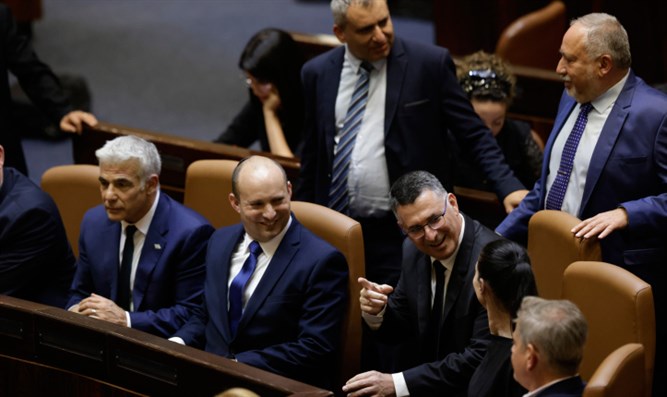
Just 37% of Israelis oppose new government – but Netanyahu
holds wide lead over Bennett as top pick for prime minister.
A plurality of Israelis support the new national unity government formed by Prime Minister Naftali Bennett and Foreign Minister Yair Lapid Sunday night, a new poll shows, even as former Prime Minister Benjamin Netanyahu remains the top pick for the premiership.
According to the poll, which was conducted by Prof. Camil Fuchs and published by Channel 13 after the establishment of the new government Sunday night, 48% of Israelis back the new government, compared to just 37% who oppose it. Among respondents who expressed an opinion on the matter, 56.5% supported the government, compared to 43.5% who oppose it.
But Israel’s new prime minister, Naftali Bennett, faces a double-digit gap with his predecessor, Netanyahu, who is the preferred candidate for the premiership for 43% of Israelis, compared to just 29% who said they prefer Bennett as premier.
Yesh Atid, by contrast, is poised to rise to 23 seats, up from its current 17, while Blue and White is projected to rise from eight seats to ten.
Among the haredi factions, Shas would fall to seven seats from its current nine if new elections were held today, while United Torah Judaism would fall from seven seats to six.
Despite previous polls showing a major drop in support for Yamina, the new poll projects the party would win seven seats, the same number it won in the March 2021 election.
The Religious Zionist Party alliance with Noam and Otzma Yehudit is projected to gain two seats, rising to eight mandates.
The New Hope and Yisrael Beytenu both polled at five seats each, down from six and seven mandates respectively.
Labor would retain its seven seats if new elections were held today, while Meretz would barely cross the electoral threshold with four seats.
The Joint Arab List is projected to retain its six seats, while the United Arab List would rise from four seats to five.
The pro-Netanyahu bloc, which won 52 seats in March, would fall to 48 seats if new elections were held today, while the left-wing – Arab bloc is projected to rise from 48 seats to 55 seats. The three right-of-center parties in the new coalition are projected to receive a total of 17 seats.
